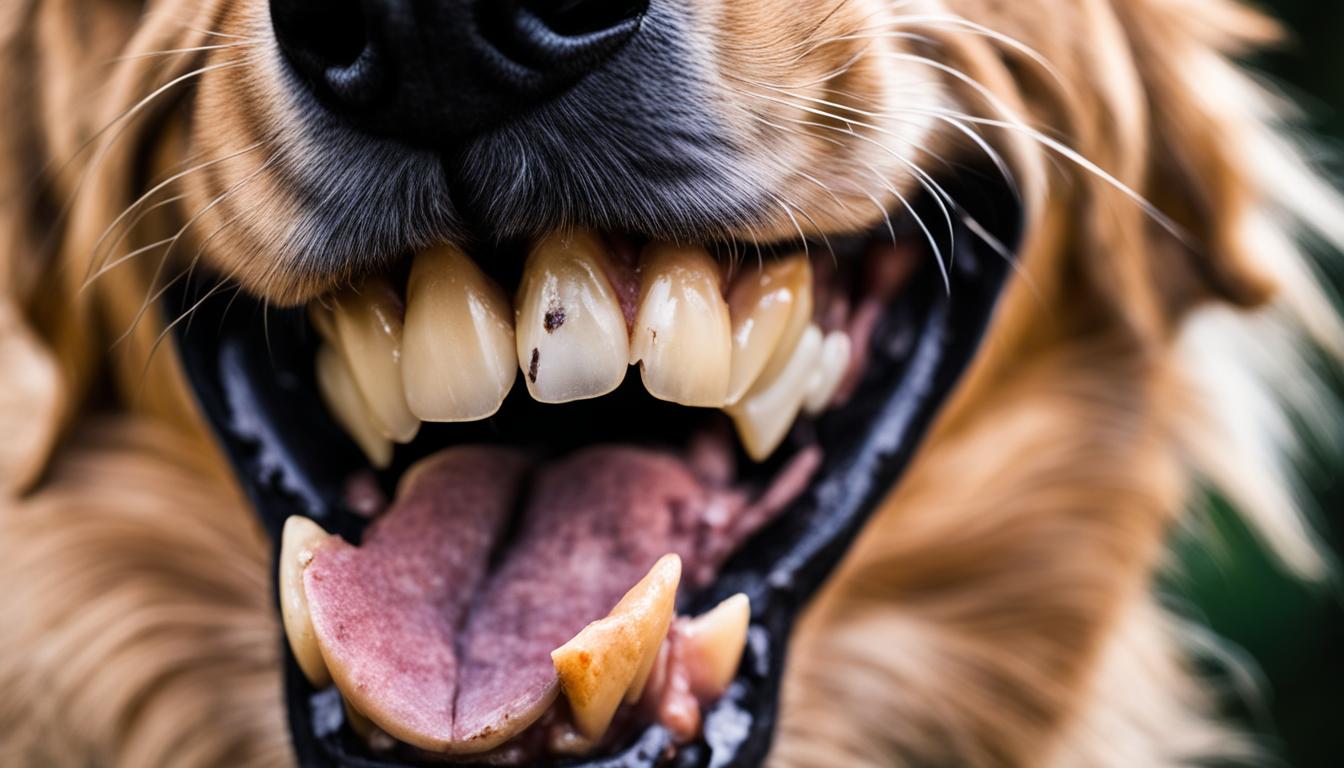When it comes to your furry friend, their health is of utmost importance. And did you know that their diet plays a vital role in keeping them happy and healthy? That’s right! A well-balanced diet is the key to ensuring your canine companion thrives. In this article, we’ll explore the nutritional issues that can affect your dog’s health and how to tackle them head-on.
Key Takeaways:
- Proper nutrition is crucial for your dog’s overall health and wellbeing.
- Obesity, pancreatitis, bladder stones, and heart disease are some common health issues that can be directly affected by your dog’s diet.
- Monitoring calorie and fat levels, as well as the quality of ingredients, is essential in maintaining a balanced diet.
- Consulting a veterinarian can provide personalized guidance on the appropriate diet for your dog’s specific needs.
- By providing your furry friend with the right nutrition, you can help them live a happier and healthier life.
Diet and Canine Obesity
Canine obesity is a widespread health issue, affecting over 50% of American dogs. It not only affects their appearance but also poses significant risks to their overall health and well-being. Dogs who are obese are more prone to conditions such as arthritis, diabetes, high blood pressure, and even cancer. To ensure a healthy weight for your canine companion, it is crucial to pay attention to their calorie intake and implement proper calorie control in their diet.
To prevent obesity and maintain a healthy weight for your dog, it is important to choose a dog food that is specifically formulated for weight management. These foods are typically lower in calories and fat, helping your dog shed excess pounds. A veterinarian or a healthy weight calculator can assist in determining your pet’s ideal weight and guide you towards the appropriate food choices.
“Maintaining a healthy weight is not only about appearance but also about promoting your dog’s longevity and improving their quality of life. By implementing calorie control and providing a balanced diet, you can help your furry friend achieve and maintain a healthy weight.”
Regular exercise is equally important in managing canine obesity. Engaging in activities such as daily walks, playtime, or even swimming can help burn calories and keep your dog physically fit. Additionally, avoid overfeeding and limit treats to maintain calorie control. Remember, a healthy weight is key to a happy and energetic dog.

Risks of Canine Obesity
Obesity in dogs can lead to a variety of health issues, including:
- Arthritis: Excess weight puts strain on joints, leading to pain and discomfort.
- Diabetes: Obesity can increase the risk of diabetes in dogs.
- High blood pressure: Similar to humans, overweight dogs can develop high blood pressure, which can have serious health consequences.
- Cancer: Obesity has been linked to an increased risk of certain types of cancer in dogs.
By maintaining a healthy weight through proper diet and exercise, you can significantly reduce the risks associated with canine obesity and ensure a happier and healthier life for your furry companion.
Nutrition and Canine Pancreatitis
Canine pancreatitis is a condition characterized by inflammation of the pancreas, often caused by high dietary fat intake. It is essential to manage and prevent further inflammation by controlling the intake of dietary fat and feeding a low-fat, easily digestible diet. This can help alleviate symptoms and improve the overall well-being of dogs with pancreatitis.
Dietary fat has been linked to the development of pancreatitis in dogs. Therefore, it is crucial to limit the consumption of high-fat foods and opt for low-fat alternatives. Consulting with a veterinarian can provide guidance on the appropriate dietary fat intake for dogs at risk or already suffering from pancreatitis.
| Pancreatitis Symptoms | Recommended Dietary Changes |
|---|---|
| Vomiting | Switching to low-fat, easily digestible food |
| Abdominal pain | Avoiding high-fat treats and table scraps |
| Loss of appetite | Ensuring a balanced diet with limited fat content |
Consultation with a veterinarian is crucial for developing an appropriate dietary plan for dogs with pancreatitis. They can recommend specific low-fat dog food options and provide guidance on portion sizes and feeding schedules to effectively manage the condition.
By prioritizing low-fat, easily digestible food choices, pet owners can help alleviate inflammation in the pancreas and support their dog’s overall health and recovery from pancreatitis.

References:
- “Pancreatitis in Dogs: Causes, Symptoms, and Treatment Options.” American Kennel Club. Accessed here.
- “Pancreatitis in Dogs.” Veterinary Medical Center of Long Island. Accessed here.
- “Dietary Management of Pancreatitis.” Veterinary Centers of America. Accessed here.
Bladder Stones and Canine Diet
Bladder stones in dogs can cause discomfort and urinary issues. Understanding the different types of bladder stones and implementing dietary prevention can be crucial in managing this condition and improving your dog’s quality of life.
Types of Bladder Stones
| Type | Composition |
|---|---|
| Calcium Oxalate Stones | Primarily composed of calcium |
| Struvite Stones | Primarily composed of magnesium and phosphates |
Identifying the type of bladder stone is important as it determines the appropriate treatment approach. Calcium oxalate stones require a different dietary strategy than struvite stones, and consulting with a veterinarian is recommended for accurate diagnosis and tailored recommendations.
Dietary Prevention and Low Calcium Diet
Implementing a low calcium diet may help deter the formation of calcium oxalate bladder stones. This can be achieved by selecting dog food formulated specifically to manage urinary issues and consulting with a veterinarian for appropriate dietary recommendations. Additionally, ensuring your dog has access to fresh water and encouraging regular urination can help flush out the urinary system and prevent stone formation.
While dietary changes are helpful in managing bladder stones, it’s important to note that they may not be effective for all cases. In some instances, surgical intervention may be necessary to remove the stones. Consulting with a veterinarian will provide the necessary guidance and support for your dog’s specific situation.
Canine Heart Health and Sodium Intake
When it comes to your dog’s heart health, the role of diet cannot be underestimated. An imbalanced diet can contribute to the development of heart disease in dogs, leading to serious implications for their overall wellbeing. One key factor to consider is sodium intake. Elevated levels of sodium in a dog’s diet can result in increased sodium circulating in the blood, leading to water retention in the blood vessels and raised blood pressure.
As blood pressure rises, the heart must work harder to overcome the added pressure, eventually resulting in heart enlargement. This can further compromise the heart’s ability to function effectively and can have detrimental effects on your dog’s health. Monitoring sodium intake and feeding a diet that is low in sodium can help maintain a healthy heart and minimize the risk of heart disease in dogs.
Consulting a veterinarian is recommended to determine appropriate sodium levels for your dog. They can provide guidance on the ideal diet to promote heart health based on your dog’s specific needs. Remember, a heart-healthy diet is an essential component of your dog’s overall wellbeing and can contribute to a long and happy life.

Benefits of a Low Sodium Diet for Dogs:
- Reduced risk of heart disease
- Lower blood pressure
- Prevention of heart enlargement
- Improved overall cardiovascular health
“Feeding a low sodium diet to your dog can greatly benefit their heart health and reduce the risk of heart disease. Consult with your veterinarian to determine the appropriate sodium levels for your furry friend and ensure they lead a long, healthy life.”
Table: Sodium Content in Common Dog Food Ingredients
| Ingredient | Sodium Content (mg/100g) |
|---|---|
| Chicken Breast | 68 |
| Beef | 70 |
| Salmon | 47 |
| Carrots | 69 |
| Spinach | 79 |
| White Rice | 1 |
Source: National Nutrient Database for Standard Reference, Release 28
Conclusion
When it comes to your furry friend’s health and wellbeing, a balanced and nutritious diet is key. By providing the right nutrients, you can help prevent a range of common canine health issues. From obesity to bladder stones, heart disease to digestive problems, proper nutrition plays a vital role in their overall wellness.
Ensuring your dog’s diet is well-balanced means paying attention to calorie and fat levels, as well as the quality of ingredients. By consulting a veterinarian, you can get personalized advice based on your dog’s specific needs, such as age, breed, activity level, and any existing health conditions.
Remember, a healthy diet goes beyond just giving your dog food. It’s about providing them with the right nutrients to support their growth, energy levels, and immune system. A well-nourished dog is a happy dog, so make sure to prioritize their canine nutrition for a long and vibrant life together.
FAQ
How does diet affect a dog’s health?
A high quality, well-balanced diet is fundamental to a dog’s health. It can directly impact issues such as obesity, pancreatitis, bladder stones, heart disease, and diarrhea.
How common is obesity in dogs?
Obesity is a nationwide epidemic for dogs, affecting over 50% of American dogs. Dogs affected by obesity have an increased risk of arthritis, diabetes, high blood pressure, and cancer.
Can diet contribute to pancreatitis in dogs?
Yes, pancreatitis can develop when the pancreas becomes inflamed, often due to a high dietary fat intake. Limiting the intake of dietary fat and feeding a low-fat, easily digestible diet can help manage and prevent further inflammation.
What can be done to prevent bladder stones in dogs?
Bladder stones can be composed of different minerals and substances. A diet lower in calcium and phosphorus may help deter their formation. Consulting a veterinarian can provide specific dietary recommendations based on a dog’s situation.
How does sodium intake affect a dog’s heart health?
Increased sodium intake can contribute to the development of heart disease in dogs. It can cause elevated levels of sodium circulating in the blood, leading to water retention in the blood vessels and elevated blood pressure.
How important is a balanced and nutritious diet for dogs?
A balanced and nutritious diet is crucial for a dog’s overall health and wellbeing. It can help prevent obesity, pancreatitis, bladder stones, heart disease, and digestive issues in dogs. Consulting a veterinarian can provide guidance on the appropriate diet for a specific dog.
Source Links
- https://www.fda.gov/animal-veterinary/outbreaks-and-advisories/fda-investigation-potential-link-between-certain-diets-and-canine-dilated-cardiomyopathy
- https://www.barkbusters.com/news/how-your-dogs-behavior-is-linked-to-nutrition/
- https://petmd.com/dog/centers/nutrition/dog-diarrhea-and-other-diseases-impacted-by-nutrition





